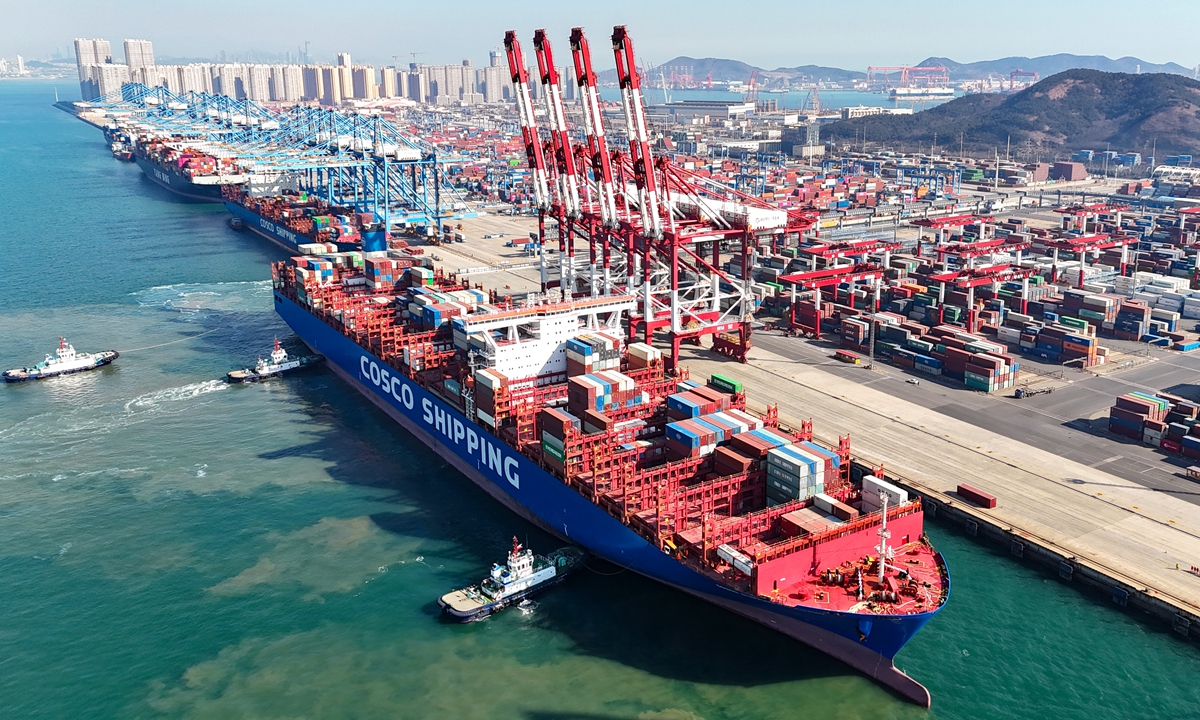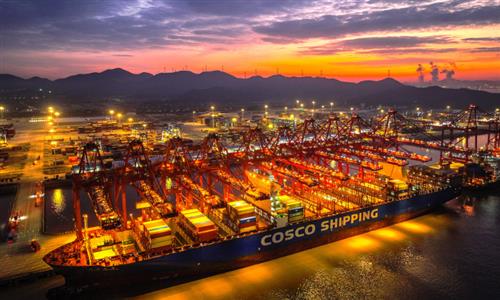New Dynamics in New Year: Chinese enterprises on massive promotional trips to clinch trade deals in early 2024

A cargo ship docks at a container terminal in Qingdao Port in East China's Shandong Province on January 25, 2024. Photo: VCG
From East China's Jiangxi Province to Southwest China's Sichuan Province, foreign trade companies are intensifying efforts to secure new orders, by participating in business trips or exhibitions abroad, a repeat of similar measures taken in early 2023 after it proved successful in helping private businesses to expand overseas market and stabilize trade flows.
At a press conference recently held by the China Council for the Promotion of International Trade (CCPIT), the organization pledged to launch more than 1,000 business trips abroad for domestic companies, targeting major economic partners such as China's neighbors, the US and European countries. It marks a deepening campaign to explore overseas markets, securing new orders to make a good start for 2024. China's local governments are also taking a prominent role.
Through this trade promotion, domestic companies are expected to capture more business opportunities across global markets and expand into a broader development space.
The action comes at a crucial time when the international economic and trade landscape continues to be fraught with challenges, including the Red Sea crisis, incessant geopolitical conflicts and rising protectionism.
Chinese companies, prodded by local governments, have also moved to enhance the competitiveness of their products by strengthening their supply chains as well as diversifying their markets to mitigate global risks.
Securing early orders
At a bustling production line in Qingshanhu district, Nanchang, the capital city of Jiangxi Province, a textile production hub in southern China, a roaring machine spits out batches of yoga clothes for clients in the US. Although it is only in the beginning of a year, Nanchang ZhongTuo Knitwear Co, a local large producer for sportswear, has seen its overseas orders fill out through to June.
Last year proved to be a strong year for China's foreign trade - the first year after the country removed its stern pandemic restrictions, which is partially attributed to their active participation of trips and events organized by local governments in exploring overseas markets.
"We followed the local government's call to go overseas to stabilize orders and expand markets, and we expected to further participate in similar business delegations abroad to be sponsored by the government in the coming months," the company's deputy general manager Qiu Zhengxiong told the Global Times.
Last year, they took part in an array of business trips abroad to attend four exhibitions. "There will always be gains from going overseas, including winning orders," Qiu said.
The difference between following the local government to explore markets overseas and companies going out on their own is obvious, he said.
Foreign investors care about credibility, having government endorsement will help increase the credibility of participating companies, and foreigners will also pay more attention to them, according to Qiu.
For American business partners, the security and reliability of orders will be better guaranteed in this way, which is especially the case for those companies that do not have a big brand name abroad.
The story at Qingshanhu is not unique.
Since the start of this year, Zhang Yan, general manager of Century International Exhibition Co based in Ningbo, East China's Zhejiang Province, has been meticulously planning business trips. His company specializes in offering comprehensive overseas exhibition services, enabling Chinese companies to showcase themselves to international partners.
Zhang told the Global Times in a recent interview that they will lead about 200 people at the end of February to participate in a hardware exhibition in Cologne, Germany, in early March.
Ningbo's campaign represents the essence of provincial government's efforts to boost trade. This year, Zhejiang is launching a new round of campaigns designed to help local companies to expand to overseas markets and win new orders.
The latest statement that Department of Commerce of Zhejiang Province sent to the Global Times on Friday revealed that, last year, a total of over 2,800 delegations travelled abroad, grabbing 190 billion yuan ($26.68 billion) in initial orders.
"This year, we will continue to carry out a new round of market exploration actions by hosting no fewer than 1,000 delegations, involving more than 10,000 enterprises," the statement said.
In addition, Zhejiang is placing greater emphasis on the high-quality development of cross-border e-commerce. The provincial government is providing more support, ranging from encouraging companies to develop their own brands to accelerating the construction of industrial parks, all aimed at bolstering trade.
The CCPIT Sichuan Council is also gearing up its efforts. They are planning on several business trips to Vietnam, Australia and New Zealand in April, as part of the efforts to stabilize foreign trade and help companies expand overseas market, as the council recently announced.
Chartered flights
Going overseas to secure orders has emerged as a significant strategy for stabilizing foreign trade. This approach demonstrated considerable efficacy when local authorities arranged chartered flights for companies to engage with clients abroad, Li Changan, a professor at the Academy of China Open Economy Studies of the University of International Business and Economics, told the Global Times.
Li said that such trips underscore the government's commitment to supporting companies going global and reflect businesses' confidence in expanding their overseas markets.
The trend of going overseas to secure orders come as foreign trade is expected to experience high volatility in 2024.
Weak global demand, a sluggish world economy, rising protectionism, intensified geopolitical conflicts, and lingering disruptions in the Red Sea have all contributed to the growing external headwinds which will impact trade, according to the Ministry of Commerce (MOFCOM).
Despite the challenges, there exist some favorable conditions for China's foreign trade development, including improved competitiveness of made-in-China products, rapid digitalization and green development, and growth in other booming industries, according to MOFCOM.
Qiu's business exemplifies this approach. In addition to actively participating in business trips and events organized by governments, his company is upgrading its production line with a greater focus on automation.
For instance, last year, the company introduced two AI fabric flaw detection systems, significantly enhancing production efficiency and product quality, resulting in increased sales in the international market. Qiu noted that more digital elements will be adopted in the production line this year.
"We are not worried about the headwinds…because we are continuously transforming, staying ahead of customer needs by providing specially tailored services and increasing our technological and automation capabilities," Qiu said, adding they are also expanding domestic market share instead of solely relying on overseas sales.
Considering their proactive measures already implemented or soon to be in place, they anticipate receiving foreign orders totaling 400 million yuan this year, which is approximately 100 million yuan higher than last year.

